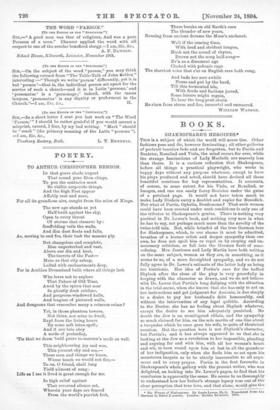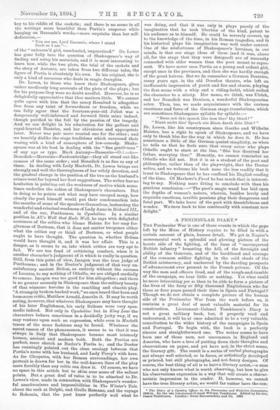BOOKS.
SHAKESPEARE'S HEROINES.* THIS is a subject of which the world will never tire. Other fashions pass and die, however fascinating ; all other galleries of portrait beauties fade and are forgotten, but to Portia and Beatrice, Rosalind and Viola, the mind recurs for ever, while the strange fascinations of Lady Macbeth are scarcely less• than theirs. It is a curious reflection that Shakespeare, before all things a practical playwright, who wrote in happy days without any purpose whatever, except to have• his plays produced and acted, should have devised all these beautiful creations for boy representatives. It accounts, of course, to some extent for his Viola, or Rosalind, or Imogen, and one can easily fancy Beatrice under the guise of a petulant page. It would not have taken much top make Lady Disdain carry a doublet and rapier for Benedick. But what of Portia, Ophelia, Desdemona P That such women could have been created under such conditions is only one of the tributes to Shakespeare's genius. There is nothing very poetical in Dr. Lewes's book, and nothing very new in what he has to say, not perhaps much more than the novelty of the twice-told tale. But, while brimful of the true German love for Shakespeare, which, to our shame it must be admitted,. breathes of a keener relish and deeper sympathy than our own, he does not spoil him or repel us by carping and un- necessary criticism, or fall into the German fault of over- refining. Mrs. Jamieson and Lady Martin have both written on the same subject, women as they are, in something, as it seems to us, of a more far-sighted sympathy, and we do not fully agree in Dr. Lewes's estimate of the latter lady as being, too histrionic. Her idea of Portia's care for the baffled. Shylock after the close of the play is very gracefully in keeping with the character as drawn, and we do not believe with Dr. Lewes that Portia's long dallying with the situation in the trial-scene, when she knows that she has only to act on, her instructions and get judgment for Antonio, is due simply to a desire to pay her husband's debt honourably, and without the intervention of any legal quibble. According to the Doctor, she has no feeling about Shylock whatever, except the desire to see him adequately punished. No doubt the Jew is an unmitigated villain, and the sympathy so much claimed for him, on the sole merits of one line about a turquoise which he once gave his wife, is quite of theatrical creation. But the question here is not Shylock's character, but Portia's; and it has always appeared to us that she is looking at the Jew as a revelation to her impossible, pleading and arguing for and with him, with all her woman's heart and wit, to turn round upon him at last in all the grandeur of her indignation, only when she finds him so set upon his. monstrous bargain as to be utterly inaccessible to all argu- ment and to every prayer. Portia is the first favourite in Shakespeare's whole gallery with the present writer, who was delighted, on looking into Dr. Lewes's pages, to find that his conclusion is apparently the same. He seems to As thoroughly to understand how her father's strange legacy rose out of the clear perception that true love, and that alone, would give the ' The Women of Shakespeare, Br Louis Lowe'', Ph.D. Translated from the. German by Helen Z =ern. London : Hodder Brothers. 1891.
key to his riddle of the caskets; and there is no scene in all the writings more beautiful than Portia's suspense while hanging on Bassanio's words,—more exquisite than her self- dedication,— " You see me, Lord Bassanio, where I stand
Such as I am "—
of the " unlesson'd girl, unschooled, unpractised?' Dr. Lewes has gone fully into the question of Shakespeare's way of finding and using his materials, and it is most interesting to learn how, while the two plots, the trial of the caskets and the story of Antonio, are taken from two different tales, the figure of Portia is absolutely his own. In his original, she is only a kind of sorceress who deals in magic draughts. Dr. Lewes, to those who know their Shakespeare, gives rather needlessly long accounts of the plots of the plays ; but for his purpose they were no doubt needful. However, he is so delightfully appreciative that that matters little. We cannot quite agree with him that the saucy Rosalind is altogether free from any taint of forwardness or freedom, while we can fully agree that the fourteen-year-old Juliet was a dangerously well-informed and forward little minx indeed, though purified to the full by the passion of the tragedy. And we can delight in his admiration for the gallant and royal-hearted Beatrice, and her chivalrous and appropriate lover. Never was pair more created one for the other ; and we heartily dislike the stage traditions which surround their wooing with a kind of atmosphere of low-comedy. Shake- speare was at his best in dealing with the "fine gentleman" of any age or type. Mark Antony—Bassanio—OiLodo- Benedick—Mercutio—Faulconbridge—they all stand out like cameos of the same order ; and Benedick is as fine as any of them. In dealing with Lady Macbeth, Dr. Lewes brings out strongly and well the thoroughness of her wifely devotion, and the gradual change in the position of the two as the husband's crimes went fur beyond her first suggestions. The writer has no hesitation in pointing out the weakness of motive which some- times underlies the action of Shakespeare's characters. But in doing so he points out what may have escaped many, how clearly the poet himself would put their condemnation into the mouths of some of the speakers themselves, instancing the wonderful and criminal weakness of Lady Anne in Richard and of the cur, Posthumus, in Cymbeline. In a similar position in All's Well that Ends Well, he says with delightful acuteness of the critics who blame Helena for her easy for- giveness of Bertram, that it does not matter twopence either what the critics say or think of Bertram, or what people ought to have thought. The question is, whether Helena would have thought it, and it was her affair. This is a danger, as it seems to us, into which critics are very apt to fall. We are too fond of criticising conduct, when it is another character's judgment of it which is really in question. Still, from this point of view, Imogen was the true judge of Posthumus ; and in the Doctor's judgment of that very un- satisfactory ancient Briton, as entirely without the excuses of Leontes, to say nothing of Othello, we are obliged cordially to concur. Imogen was too good for him altogether; and there is no greater anomaly in Shakespeare than the solitary beauty of that winsome heroine in the rambling and chaotic play. "A strangely broken-backed work," we once heard that keen and humorous critic, Matthew Arnold, describe it. It may be worth noting, however, that whatever Shakespeare may have thought of his later Englishmen, his early Britons were very spas- modic indeed. Not only in Cymbeline but in King Lear the characters behave sometimes in a decidedly jerky way, if we may venture upon such an expression, while even in Macbeth traces of the same fashions may be found. Whatever the secret reason of the phenomenon, it seems to us that it was always in Italy that Shakespeare became most intensely human, ancient and modern both. Both the Portias are perfect, mere sketch as Butler's Portia is; and the Doctor has cunningly pointed out the close analogy between that Portia's scene with her husband, and Lady Percy's with hers. As for Cleopatra, with her Roman surroundings, her own portrait is drawn for her in the well-known lines of the play more forcibly than any critic can draw it. Of course, we have no space in this article but to skim over some of the salient points. But a great deal of value is to be attached to Dr. Lewes's view, made in connection with Shakespeare's wonder- ful anachronisms and impossibilities in The Winter's Tale, about the rock at Delphi, and Giulio Romano, and the voyage to Bohemia, that the poet knew perfectly well what he was doing, and that it was only in plays purely of the imagination that he took liberties of the kind, patent to his audience as to himself. He could be severely correct, up to the knowledge of the time, in his Roman tragedies, and in his historical plays his imagination was well under control. One of the misfortunes of Shakespeare's heroines, in our minds, is that our stage ideas of them (and it was, above all, for the stage that they were designed) are of necessity connected with older women than the poet meant to repre- sent. We have never seen Portia as a young and ardent girl, except once in the provinces, and then she was hardly enough of the great heiress. But we do remember a German Beatrice, many years ago, in the old Dresden theatre, who left an ineffaceable impression of youth and fire and charm, playing the first scene with a whip and a riding-habit, which suited the character to a nicety. Her name, we think, was Ulrich, and her Benedick was Dawisen, a wonderful Shakespearian actor. Then, too, we made acquaintance with the curious exactness and force of the German stage-translations, which are sometimes Shakespeare syllable for syllable
" Runs not this speech like iron thro' thy blood ? "
"Blunt nicht dios' Sprach wie Eisen durch dein Blut ? "
Dr. Lewes, like his countrymen since Goethe and Wilhelm Meister, has a right to speak of Shakespeare, and we have only to thank him for the way in which he does it. He has sometimes a little of the German quaint simplicity, as when he tells us that he feels sure that every actor who plays Othello ought to start at the line, "She has deceived her father, marrying thee." Honestly, we cannot remember an Othello who did not. But it is as a student of the poet and philosopher, rather than of the playwright, that the Doctor writes, and we welcome his book none the less readily that it isnot to Shakespeare that he has confined his English reading of the time. Of Marlowe's Faust he has much that is interest-
ing to say. Nothing more fitting to conclude with than his gracious conclusion :—" The poet's magic wand has laid open the depths of woman's nature, wherein, besides lovely and exquisite emotions, terrible passions play their dangerous and fatal part. We take leave of the poet with thankfulness and wonder. We turn back to him continually with constant new delight."







































 Previous page
Previous page